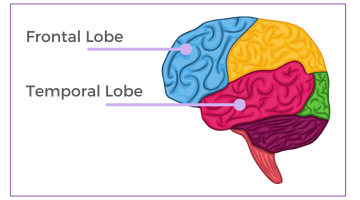Frontotemporal Dementia

Frontotemporal Dementia (FTD) is a group of related disorders that damage the frontal and temporal lobes of the brain.1 The frontal lobe is located behind the forehead and the temporal lobe is the area behind the ears. FTD is typically diagnosed in people in their 40s and early 60s. Signs and symptoms related to FTD are progressive and can worsen over time.
The three types of disorders linked to FTD include2:
- Behavioral variant frontotemporal dementia (bvFTD) is the most common disorder. People with bvFTD experience changes in their personality and behavior. Memory loss is not a prominent sign in people with this disorder.
- Primary progressive aphasia (PPA) is a disorder that typically affects a person's ability to read, write, and speak. In some cases, people with PPA may lose their ability to speak entirely.
- Movement disorders associated with FTD are rare but can occur. Signs and symptoms may include body stiffness, unexplained falls, and slow movements.
What causes frontotemporal dementia?
FTD is marked by the abnormal forms or buildup of proteins called tau and TDP-43 in the frontal and temporal lobe of the brain, causing these areas to shrink.1,2 The underlying cause of FTD is still unknown.
Who is at risk?
Family history is the only known risk factor for FTD.1,3 In many cases, the cause is unknown.
What are the signs & symptoms of frontotemporal dementia?
Signs and symptoms related to FTD can vary and progress slowly or rapidly.3 They can also manifest differently based on the area of the brain affected. This makes it difficult to determine which type of FTD a person has.2 Changes in behavior and language are common in people with FTD. Other signs and symptoms may include3:
- Being easily distracted
- Difficulty speaking, writing or reading
- Trouble walking or maintaining balance
- Loss of motivation
- Inability to express emotions
- Indifference to usual life activities

How is frontotemporal dementia diagnosed?
There is no specific test to diagnose FTD.4 Doctors can perform a variety of tests including blood tests, sleep studies, and brain scans to help determine a diagnosis. Since FTD is hard to diagnose due to signs and symptoms sharing similarities with other conditions, family members or those close to the person often play an important role in sharing any early changes in behavior or language with doctors.1,3
Getting an early diagnosis can help people and their families find the resources and support they need to live with frontotemporal dementia.
How is frontotemporal dementia treated?
There is no known cure or treatment to stop or reverse the brain changes associated with FTD.3 However, there are strategies and medication options available to help address behavioral symptoms.2 Strategies to address behavioral symptoms may involve providing choices with specific options instead of open-ended questions. For instance, “Do you want to wear a green or purple shirt?” may be easier to answer than a more open-ended question “What do you want to wear?”.
Medications may be used to treat certain types of behaviors. Antidepressants are commonly used to treat impulsive behaviors. Low doses of antipsychotic medications are sometimes used to address delusions or aggressive behaviors.

References
- Alzheimer's Association. Frontotemporal Dementia. https://www.alz.org/alzheimers-dementia/what-is-dementia/types-of-dementia/frontotemporal-dementia
- National Institute on Aging. What Are Frontotemporal Disorders? Causes, Symptoms, and Treatment. https://www.nia.nih.gov/health/what-are-frontotemporal-disorders
- Johns Hopkins Medicine. Frontotemporal Dementia. https://www.hopkinsmedicine.org/health/conditions-and-diseases/dementia/frontotemporal-dementia
- Mayo Clinic. Frontotemporal dementia - Diagnosis & treatment. https://www.mayoclinic.org/diseases-conditions/frontotemporal-dementia/diagnosis-treatment/drc-20354741

